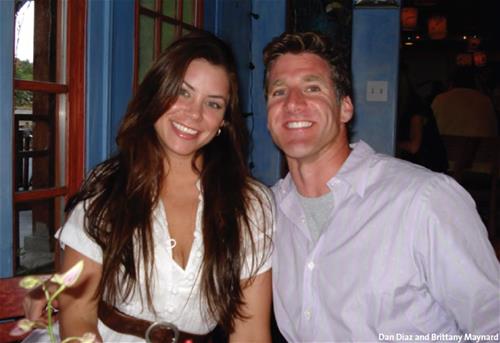
When the California legislature passed the End of Life Option Act in June of 2016, mentally capable, terminally ill patients with six months or less to live became eligible to receive medication from their physician to bring about a peaceful death. Sansum Clinic, the largest outpatient healthcare provider on the central coast, was already discussing how its 200 doctors should implement the new bill. Ultimately, Sansum Clinic decided to provide this option in the appropriate clinical situation, while still allowing individual
physicians to opt out. Sansum’s staff and board leaders felt strongly about supporting patients in this difficult stage of life, and not abandoning the responsibility to carry out the new law.
Dan Diaz applauds that decision. His wife, Brittany Maynard, was the face of the contentious campaign to pass the End of Life Option Act in California. “I’m so grateful Sansum Clinic is a medical institution that allows their physicians to decide for themselves and have those conversations with patients,” commented Dan.
In 2014, aggressive brain cancer left his 29 year-old wife struggling with debilitating headaches and seizures. Surgeries couldn’t completely remove the cancer or stop the tumor from returning. Treatment options only guaranteed terrible side effects for the time she had left. “Brittany said, ‘I will not die like that’,” explains Dan. She was determined to have the option of ending her life on her own terms, and didn’t want her family to watch her suffer. The couple chose to leave their family and their Alamo, California home for Oregon, a state that has allowed physician-assisted death for more than 20 years.
Brittany felt the lack of this choice for the dying in California was a huge injustice. When she began to speak up, her personal story thrust them both into the national spotlight.
On November 1, 2014, Brittany decided her time had come. Even morphine couldn’t alleviate her pain and the terrifying seizures had become too much, according to Dan. Within five minutes of taking the prescribed medication, she fell asleep. Thirty minutes later, her breathing slowed to the point where she passed away.
Though it’s been more than two years since her death, Dan’s grief is still visibly fresh. “Some days are tough. There are times when I feel I have been cheated that my wife is not here,” he shares. “But I don’t let myself stay in that frame of mind. Instead, I focus on the conversation that Brittany started.”
Dan traded his career in the consumer package goods industry for a consultant position with the nonprofit, Compassion & Choices. He travels the country educating legislators, medical professionals and the public on end-of-life options. He spoke in Santa Barbara in November, hoping to change minds by sharing Brittany’s journey. “This program – medical aid in dying – does not result in more people dying. It results in fewer people suffering,” he stresses. “This affects a small number of individuals, but the relief it provides that person and their family is tremendous.”
On the road, he’s met surgeon generals and cabinet members, and has spoken at several renowned medical institutions like Cleveland Clinic. “In a million years I never would have expected that these are the turns that my life would have taken. But this is how I honor Brittany and her legacy.” Dan took his charge from his wife’s legal will, which stated her husband should be the sole keeper of her story and continue the fight she began.
Right now, medical aid in dying is only authorized in Oregon, Vermont, Washington, Montana, California and Colorado. Each state’s requirements are slightly different, but all the legislation mandates that witnesses confirm the request is voluntary. Also, the patient must be mentally competent and informed of all options. A physician must provide the medication and the patient needs to be able to take it independently.
As Dan meets people who share a fate similar to Brittany’s, the memories often come flooding back, perhaps making it difficult to grieve and move on. But Dan is energized. “Moments like that charge my batteries. I think, ‘All right, point me in the direction of the next state.’ And I do remember the good times. So there is a little bit of therapy in it for me as well.” At every venue, he aims to steer his audience beyond the political and religious rhetoric surrounding these laws. He recommends that all families discuss before serious health issues arise what loved ones prefer at their time of death, what measures they want taken, and how they wish to be memorialized. Dan plans to travel to Washington, D.C. and New York state in 2017, and anywhere else he can impact the conversation on pending legislation. He witnessed first-hand Brittany’s influence on the debate in California, and he takes that up as his charge to continue. “If I didn’t, I’d find myself feeling sad all the time,” he reflects. “I am not going to allow for that. Certainly Brittany didn’t. So I won’t either.”